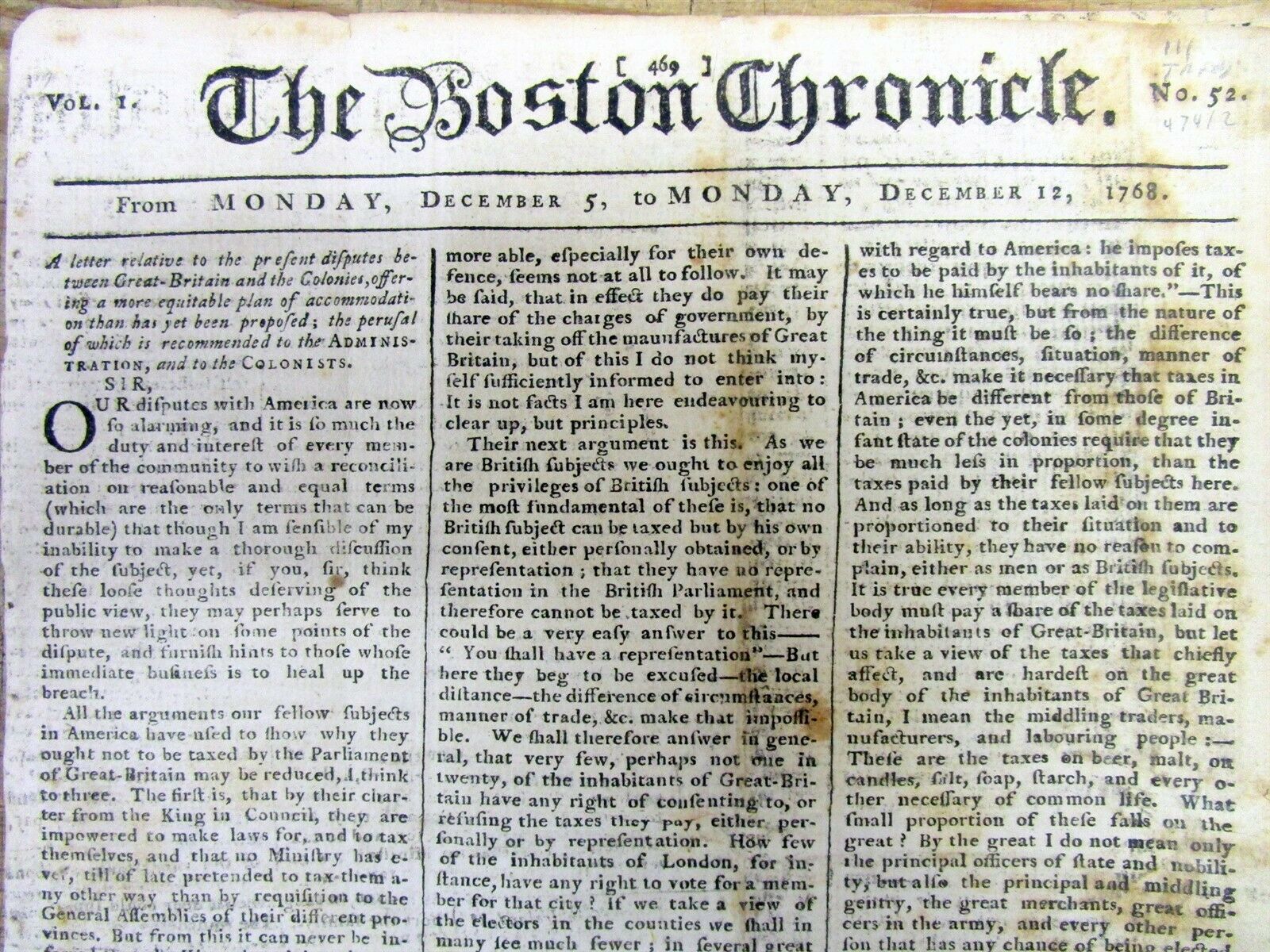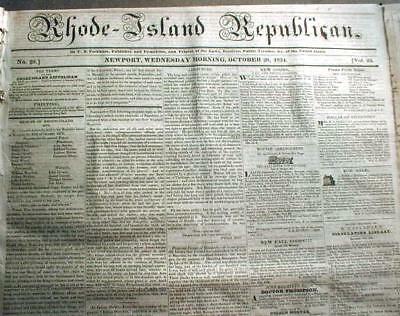-40%
<1768 Pre Revolutionary War Newspaper BOSTON TENSIONS TAXATION no REPRESENTATION
$ 132
- Description
- Size Guide
Description
<1768 Pre Revolutionary War Newspaper BOSTON TENSIONS TAXATION no REPRESENTATION1768 Pre Revolutionary War Newspaper with a long and detailed front-page editorial concerning the growing TENSIONS in Boston, Massachusetts regarding TAXATION w/o REPRESENTATION and the quartering of British troops in the city against the colonials' wishes
- inv # 7T-239
Please visit our
EBAY STORE
for THOUSANDS MORE HISTORICAL NEWSPAPERS for SALE or at auction
SEE PHOTO(s) - COMPLETE ORIGINAL NEWSPAPER, the
Boston Chronicle
(MA) dated December 12, 1768 with compelling pre Revolutionary War news as tensions grow between the two adversaries. This issue features a prominent front-page editorial on the worsening conditions since the Townshend Acts went into force.
The Townshend Acts were a series of measures, passed by the British Parliament in 1767, that taxed goods imported to the American colonies. But American colonists, who had no representation in Parliament, saw the Acts as an abuse of power. The British sent troops to America to enforce the unpopular new laws, further heightening tensions between Great Britain and the American colonies in the run-up to the American Revolutionary War.
The British Crown emerged victorious from the French and Indian War in 1763, but defending the North American colonies from French expansion had proved tremendously costly to England.
Compared to Great Britain’s debts, the cost of the French and Indian War to the colonists had been slight. The colonists—who arguably enjoyed a higher standard of living at the time than their British counterparts—paid less than one-twentieth the taxes of British citizens living in England.
The British government thought the colonists should help pay the cost of their protection. The British Parliament enacted a series of taxes on the colonies for the purpose of raising revenue. Early attempts, such as the Stamp Act of 1765—which taxed colonists for every piece of paper they used—were met with widespread protests in America.
The Townshend Acts, named after Charles Townshend, British chancellor of the Exchequer, imposed duties on British china, glass, lead, paint, paper and tea imported to the colonies.
Benjamin Franklin had informed the British Parliament that the colonies intended to start manufacturing their own goods rather than paying duties on imports. These particular items were chosen for taxation because Townshend thought they would be difficult things for the colonists to produce on their own. He estimated the duties would raise approximately 40,000 pounds, with most of the revenue coming from tea.
While the original intent of the import duties had been to raise revenue, Charles Townshend saw the policies as a way to remodel colonial governments. The Townshend Acts would use the revenue raised by the duties to pay the salaries of colonial governors and judges, ensuring the loyalty of America’s governmental officials to the British Crown. However, these policies prompted colonists to take action by boycotting British goods.
Charles Townshend didn’t live to see the measures enacted. He died suddenly in September 1767, before the detrimental effects of his signature rules could materialize.
The Townshend duties went into effect on November 20, 1767, close on the heels of the Declaratory Act of 1766, which stated that British Parliament had the same authority to tax the American colonies as they did in Great Britain. By December, two widely circulated documents had united colonists in favor of a boycott of British goods.
These influential pamphlets included “Letters from a Farmer in Pennsylvania,” a series of essays written by Pennsylvania legislator John Dickinson and the “Massachusetts Circular Letter,” a statement written by Samuel Adams and James Otis Jr. and passed by the Massachusetts House of Representatives to other colonial legislatures.
With the help of the Sons of Liberty—a secret society of American business leaders who coined the phrase “taxation without representation”—24 towns in Massachusetts, Connecticut and Rhode Island agreed to boycott British goods in January 1768.
With the exception of necessities, such as fishing hooks and wire, New England merchants agreed not to import British goods for one year. New York followed suit in April, with an even more restrictive non-importation agreement.
In response to protests and boycotts, the British sent troops to occupy Boston and quell the unrest.
Very good condition. This listing includes the complete entire original newspaper, NOT just a clipping or a page of it. STEPHEN A. GOLDMAN HISTORICAL NEWSPAPERS stands behind all of the items that we sell with a no questions asked, money back guarantee. Every item we sell is an original newspaper printed on the date indicated at the beginning of its description. U.S. buyers pay priority mail postage which includes waterproof plastic and a heavy cardboard flat to protect the purchased item from damage in the mail. Upon request by the buyer, we can ship by USPS Media Mail to reduce postage cost; however, please be aware that USPS Media Mail can be very slow in its time of transit to the buyer. International postage is quoted when we are informed as to where the package is to be sent. We do combine postage (to reduce postage costs) for multiple purchases sent in the same package.
We list thousands of rare newspapers with dates from 1570 through 2004 on Ebay each week. This is truly SIX CENTURIES OF HISTORY that YOU CAN OWN!
Stephen A. Goldman Historical Newspapers has been in the business of buying and selling historical newspapers for over 50 years. Dr. Goldman is a consultant to the Freedom Forum Newseum and a member of the American Antiquarian Society. You can buy with confidence from us, knowing that we stand behind all of our historical items with a 100% money back guarantee. Let our 50+ years of experience work for YOU ! We have hundreds of thousands of historical newspapers (and their very early precursors) for sale.
Stephen A. Goldman Historical Newspapers
has been in the business of buying and selling historical newspapers for over 50 years. We are located in the charming Maryland Eastern Shore town of OXFORD, Maryland.
Dr. Goldman is a consultant to the Freedom Forum Newseum and a member of the American Antiquarian Society. You can buy with confidence from us, knowing that we stand behind all of our historical items with a 100% money back guarantee. Let our 50+ years of experience work for YOU ! We have hundreds of thousands of historical newspapers (and their very early precursors) for sale.
We invite customer requests for historical newspapers that are not yet located in our extensive Ebay listing of items. With an inventory of nearly a million historical newspapers (and their early precursors) we are likely have just the one
YOU
are searching for.
WE ARE ALSO ACTIVE BUYERS OF HISTORICAL NEWSPAPERS, including large and small personal collections, bound volumes, significant individual issues, or deaccessions from libraries and historical societies. IF YOU WANT TO SELL, WE WANT TO BUY !!!
Powered by SixBit's eCommerce Solution




















